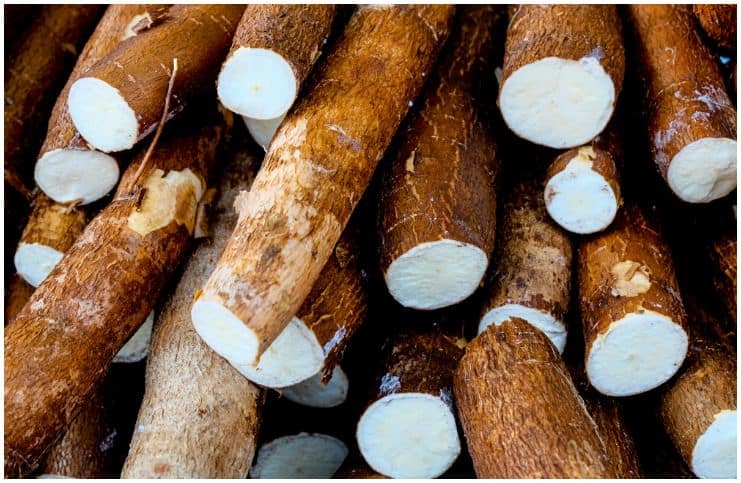Yucca (Cassava) Root – Side Effects, Nutrition Facts, Uses, Health Benefits:
The name yucca applies to as many as 40 species of shrubs and trees. They belong to the Asparagaceae family and are native to the arid and hot parts of the Americas and the Caribbean, but are eaten all over Latin America, South Asia, and Africa.
The name ”Yucca” is derived from “yuca,” a Carib Indian name for the tapioca plant (Manihot esculenta) or cassava, of the euphorbia family.
Most westerners know cassava as the tapioca plant, the roots are made into tapioca for your tapioca pudding.
Nutrition facts
It is a good source of minerals (such as – iron, calcium, magnesium, sodium, phosphorus, potassium, copper, zinc, magnesium, selenium), vitamins (like – vitamin C, vitamin E, thiamin, niacin, vitamin K, riboflavin, vitamin B9, pantothenic acid). Moreover, it contains choline, and protein, plus, a 100-gram serving contains about 2 grams of dietary fiber.
Uses and Health Benefits
Native Americans have a history of using plant roots and leaves to treat many conditions and diseases, such as joint inflammation, sprains, and even wounds.
Poultices made from the leaves were used to heal skin sores, to treat dandruff and hair loss.
Cardiovascular health
Phytochemicals extracted from cassava exhibit antioxidant properties that may help to prevent cardiovascular disease, in which hyperactivity of blood platelets is a factor.
Dietary fiber
Adults and children need at least 20 to 30 grams of dietary fiber per day for good health, but most Americans get only about 15 grams a day.
Disorders that can arise from a low-fiber diet include diverticulitis, constipation, irritable bowel syndrome, heart disease, and some cancers.
With 3.7 grams of fiber per 1-cup serving, this root has between 9.7% and 17.6% of your recommended intake for fiber.
Type 2 diabetes prevention
In the U.S., more than 24 million adults and children (nearly 8% of the population) have diabetes. In adults, type 2 diabetes accounts for about 90 to 95% of all diagnosed cases of diabetes.
Adding cassava to your diet can help regulate insulin and glucose levels, thereby preventing the peaks and plunges of blood sugar that can lead to type 2 diabetes. Given that diabetes is believed by some to be a global pandemics, adding this root to your diet seems like a great choice!
A good source of vitamin B9
Folate, or vitamin B9, is one of many vital vitamins found in green leafy vegetables, broccoli, corn, peas, oranges, grains, or cereals. Folate deficiency is a known cause of anemia in both children and adults.
A Polish study found that folate supplementation encourages normal serum cholesterol levels. In the study of 124 individuals, researchers observed significant reductions in bad cholesterol levels in subjects who had been supplemented with 4 mg of folate/day for 12 weeks. A 1-cup serving of cassava has 56 micrograms of folic acid.
Vitamin C
A single cup of this root boasts more than 42mg of vitamin C, an essential antioxidant, along with beta-carotene, vitamin E, and many other plant-based nutrients. You need vitamin C for the repair and growth of tissues in all parts of your body.
In your diet, vitamin C plays an important role in iron absorption (iron contributes to overall well-being and beauty).
Saponins
This root is a rich source of a phyto compound called saponins, which acts as a natural steroid and supports cartilage formation. In doing so, it may assist in relieving symptoms of osteoarthritis and rheumatoid arthritis.
Skin protection
There are some photoprotective properties of cassava that make it effective for protecting the skin against damage from the sun.
Additionally, the resveratrol found in this root is proven to strengthen skin and increase its resistance to degradation from free radicals, which can eventually lead to skin cancer.
Also, studies concluded that resveratrol can prevent or treat the following conditions: inflammation, atherosclerosis, cancer, high bad cholesterol, and heart disease.
Weight loss
The root is free of saturated and trans fats, as each cup contains only 0.6 g unsaturated fat. Correlated with the fact that 100 grams of cooked cassava leaves only contain about 37 calories, this plant is perfect for weight loss.
How to serve
Any recipe that calls for potatoes can be replaced with this root, and it just needs more cooking. First, peel off the rough brown skin, then cut open and remove the hard core.
Side effects of yucca root (cassava)
The roots and leaves are high in hydrocyanic acid, which is an organic poisonous compound, but when the plants are cooked for at least 10 minutes, the acid disappears.
Some people have developed contact urticarial while handling the plant. Overuse may cause indigestion.
It is suggested to give a two-day break from eating cassava each week if you are consuming it over a long period of time. Various animal-based studies have shown that excess amounts of saponins may cause red blood cells to burst in the body, a condition known as hemolysis.
READ THIS NEXT:
Matcha Green Tea – Side Effects
Jiaogulan Tea (Southern Ginseng) – Side Effects
Moringa Oleifera – Health Benefits
Tribulus Terrestris – Side Effects
References http://www.ncbi.nlm.nih.gov/pubmed/24002360 https://jhpn.biomedcentral.com/articles/10.1186/s41043-016-0050-4 http://www.ncbi.nlm.nih.gov/pmc/articles/PMC1440857/


